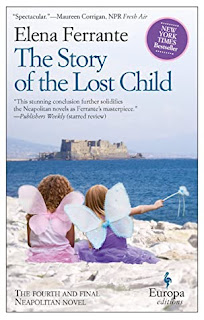The Compelling Narrative of Elena Ferrante
Today’s topic is about narrative and novels. I’ve been listening to what is a 36-hour audio book titled The Story of the Lost Child by Elena Ferrante. I’m a huge fan of autobiographies and biographies, and I love reading about other female authors. The narrator Elena Grecco tells one of the most shocking and compelling stories about her life in Naples.
In discussing
this book’s narrative with my friend, he asked me, “Why is it so
shocking when she reveals important plot points. You just don’t see it
coming.” Ferrante is gifted at telling a story through what I called
“immediacy,” which means she tells the story exactly as it unfolded to
her. In real life, we don’t have foreshadowing and little breadcrumbs
that get dropped when something major is about to happen. We might see
hints in a character’s behavior, but that’s all the hints we get in this
kind of narrative.
As a result,
Ferrante’s life experiences – and many are indeed dramatic and shocking –
come across in a real-time way, hence “immediacy.” Readers experience
these events right along with our narrator. Many times throughout the
story I was like, “No…” or “No way.” This technique hooks the reader
into the experience of the story,
and leaves the reader intrigued and wanting to hear the rest. These
various bombshells are sprinkled throughout the book. I got so hooked on
the story, I was completely absorbed and wanting to know what happens
next.
The writing is
excellent, and the book is one of the best I’ve read. When writers read
other people’s writing, it gives them ideas on how to handle certain
types of narrative. I teach authors a critical skill: You can’t break the rules until you know the rules.
Reading award-winning works can teach you a lot about how to write.
Narrative itself, though, has specific structure (the rules you need to
know before you attempt to get creative with them). Ferrante appears to
make a decision in her work not to talk ahead of the events. She invites
you into her world as it unfolds. She knows how to handle narrative,
and I noticed she doesn’t use a lot of dialog.
First-time or
new authors sometimes try to twist the rules around when they haven’t
mastered the structure. In these cases, the stories become twisted up
and difficult to follow. If the authors also has too many problems with
grammar and usage, it becomes a big mess. I’ve had to sort through books
before that I quite honestly got headaches even trying to figure out.
My advice is
don’t take literary license until you’ve earned your “license” to do so.
Start with basic narrative structures and tell the story. Avoid
experimentation in early novels and keep it simple. As you progress in
your skills then start dabbling in different formats and structures.
Learn the rules and THEN break rules.




Comments
Post a Comment